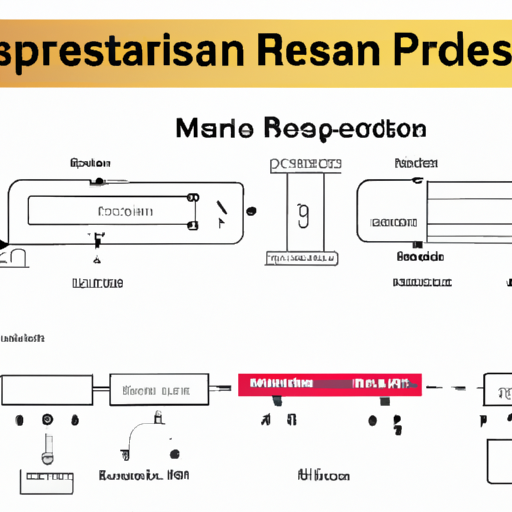What Industries Are the Application Scenarios of High Voltage Resistors Included In?
I. Introduction
High voltage resistors are critical components in various electronic and electrical systems, designed to handle high voltage levels while maintaining stability and performance. These resistors play a vital role in ensuring the safety and efficiency of numerous applications across multiple industries. In this article, we will explore the definition of high voltage resistors, their importance, and the diverse industries that utilize them.
II. Understanding High Voltage Resistors
A. What are High Voltage Resistors?
High voltage resistors are specialized resistive components that can withstand high voltage levels, typically exceeding 1,000 volts. They are designed to provide precise resistance values while ensuring minimal power loss and heat generation.
1. Technical Specifications
High voltage resistors are characterized by their voltage rating, power rating, tolerance, and stability. The voltage rating indicates the maximum voltage the resistor can handle without breaking down, while the power rating specifies the maximum power it can dissipate without overheating.
2. Types of High Voltage Resistors
There are several types of high voltage resistors, including wire-wound resistors, thick film resistors, and thin film resistors. Each type has its unique properties and applications, making them suitable for different scenarios.
B. Key Characteristics and Performance Metrics
1. Voltage Rating
The voltage rating is a crucial specification for high voltage resistors, as it determines their suitability for various applications. Resistors with higher voltage ratings are essential in power generation and distribution systems, where high voltages are commonplace.
2. Power Rating
The power rating indicates how much power a resistor can handle without overheating. This characteristic is vital in applications where resistors are subjected to continuous or pulsed power loads.
3. Tolerance and Stability
Tolerance refers to the allowable deviation from the specified resistance value, while stability indicates how well a resistor maintains its performance over time and under varying environmental conditions. High voltage resistors must exhibit low tolerance and high stability to ensure reliable operation in critical applications.
III. Industries Utilizing High Voltage Resistors
High voltage resistors find applications in a wide range of industries, each with unique requirements and challenges.
A. Power Generation and Distribution
1. Role in Electrical Grids
In power generation and distribution, high voltage resistors are essential for voltage regulation and load balancing. They help manage the flow of electricity through electrical grids, ensuring that power is delivered efficiently and safely.
2. Applications in Renewable Energy Systems
With the rise of renewable energy sources, such as solar and wind, high voltage resistors are increasingly used in inverters and converters to manage the high voltages generated by these systems. They play a crucial role in converting and regulating power for grid integration.
B. Telecommunications
1. Use in Signal Processing Equipment
In telecommunications, high voltage resistors are used in signal processing equipment to ensure signal integrity and minimize distortion. They are critical in maintaining the performance of communication systems.
2. Importance in Network Infrastructure
High voltage resistors are also employed in network infrastructure, where they help manage power distribution and protect sensitive equipment from voltage spikes.
C. Automotive Industry
1. Application in Electric Vehicles (EVs)
The automotive industry, particularly with the rise of electric vehicles (EVs), relies heavily on high voltage resistors. These components are used in battery management systems, power electronics, and charging stations to ensure safe and efficient operation.
2. Role in Hybrid Systems
In hybrid vehicles, high voltage resistors are essential for managing the interaction between the internal combustion engine and electric motor, optimizing performance and fuel efficiency.
D. Aerospace and Defense
1. Use in Avionics Systems
In aerospace, high voltage resistors are critical components in avionics systems, where they help manage power distribution and ensure the reliability of electronic systems in aircraft.
2. Applications in Military Equipment
Military applications also utilize high voltage resistors in various equipment, including radar systems and communication devices, where reliability and performance are paramount.
E. Medical Equipment
1. Role in Diagnostic Devices
In the medical field, high voltage resistors are used in diagnostic devices, such as MRI machines and X-ray equipment, where they help manage high voltages safely and effectively.
2. Applications in Imaging Systems
High voltage resistors are also employed in imaging systems, ensuring accurate and reliable performance in critical medical applications.
F. Industrial Automation
1. Use in Robotics and Control Systems
In industrial automation, high voltage resistors are used in robotics and control systems to manage power distribution and ensure the safe operation of machinery.
2. Applications in Manufacturing Equipment
High voltage resistors are also found in various manufacturing equipment, where they help regulate power and protect sensitive components from voltage fluctuations.
G. Consumer Electronics
1. Role in High-Performance Devices
In consumer electronics, high voltage resistors are used in high-performance devices, such as televisions and audio equipment, to ensure optimal performance and reliability.
2. Applications in Home Appliances
High voltage resistors are also employed in home appliances, where they help manage power distribution and protect against voltage spikes.
IV. Specific Application Scenarios
A. High Voltage Testing
1. Importance in Quality Assurance
High voltage testing is a critical process in quality assurance, ensuring that electrical components can withstand high voltage levels without failure. High voltage resistors are essential in these testing setups, providing accurate measurements and reliable performance.
2. Use in Research and Development
In research and development, high voltage resistors are used to test new materials and technologies, helping engineers and scientists develop innovative solutions for various applications.
B. Voltage Dividers
1. Role in Measurement Systems
Voltage dividers are circuits that use high voltage resistors to divide voltage levels for measurement purposes. They are essential in various measurement systems, ensuring accurate readings and reliable performance.
2. Applications in Calibration
High voltage resistors are also used in calibration applications, where they help ensure that measurement devices are accurate and reliable.
C. Surge Protection
1. Importance in Electrical Safety
Surge protection is crucial in electrical systems, where high voltage spikes can cause damage to sensitive equipment. High voltage resistors are used in surge protection devices to manage these spikes and ensure electrical safety.
2. Use in Circuit Protection Devices
High voltage resistors are integral components in circuit protection devices, helping to safeguard electrical systems from voltage surges and ensuring reliable operation.
V. Challenges and Considerations
A. Design Challenges
1. Thermal Management
One of the primary challenges in designing high voltage resistors is thermal management. High power levels can generate significant heat, requiring careful consideration of materials and design to ensure reliable performance.
2. Material Selection
Material selection is another critical challenge, as high voltage resistors must be made from materials that can withstand high voltages and temperatures while maintaining stability and performance.
B. Regulatory Standards
1. Compliance with Industry Standards
High voltage resistors must comply with various industry standards to ensure safety and reliability. Manufacturers must adhere to these standards during the design and production process.
2. Safety Considerations
Safety is paramount in the design and application of high voltage resistors. Engineers must consider potential hazards and implement safety measures to protect users and equipment.
VI. Future Trends and Innovations
A. Advancements in Materials and Technology
The future of high voltage resistors is likely to be shaped by advancements in materials and technology. New materials with improved thermal and electrical properties may lead to more efficient and reliable resistors.
B. Emerging Applications in New Industries
As technology continues to evolve, high voltage resistors may find applications in emerging industries, such as electric aviation and advanced energy storage systems.
C. The Role of High Voltage Resistors in Sustainable Technologies
High voltage resistors will play a crucial role in sustainable technologies, helping to manage power in renewable energy systems and electric vehicles, contributing to a greener future.
VII. Conclusion
High voltage resistors are essential components in various industries, from power generation and telecommunications to automotive and medical equipment. Their ability to handle high voltages safely and efficiently makes them critical in ensuring the reliability and performance of numerous applications. As technology continues to advance, the importance of high voltage resistors will only grow, paving the way for innovative solutions and sustainable technologies.
VIII. References
- Academic Journals
- Industry Reports
- Manufacturer Specifications and Guidelines
In summary, high voltage resistors are integral to modern technology, and their applications span a wide range of industries. Understanding their role and importance can help us appreciate the complexity and innovation behind the devices we rely on every day.












